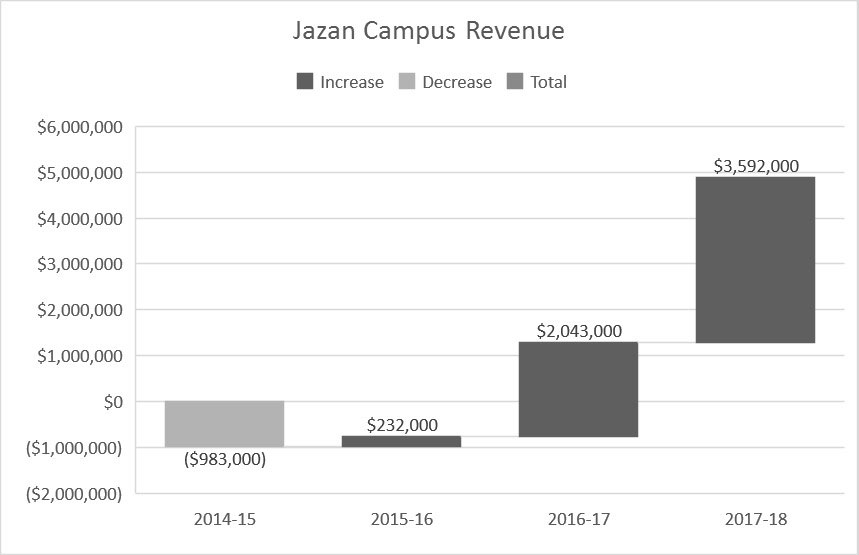
Algonquin continues to look for new campus opportunities in the Middle East, despite the campus in Jazan, Saudi Arabia losing over $1 million last school year and drawing a storm of media and union criticism.
College officials are continuing with the campus and new plans despite criticism over both the campus in Jazan and the one which opened in Kuwait this past September. In addition to Jazan and Kuwait, Algonquin has been researching campus opportunities in Dubai, Vietnam, India and China.
Yet many have been critical of the Jazan campus, due to the initial $19.9 million revenue projections over five years being quickly downgraded to just under $5 million.
As well, Ontario premier Kathleen Wynne last week called the segregated campuses operated by Algonquin and Niagara colleges “unacceptable.” Reza Moridi, the Ontario minister of colleges and universities, was to meet with representatives from both Niagara and Algonquin colleges this weekend, to discuss the situation Wynne said has “got to change.”
Algonquin said in a press release sent to the Times Jan. 25, “The Saudi government subsequently opened up additional campuses for bidding, and in the second wave Algonquin College was not successful in our goal of obtaining a women’s college. We are exploring options to open a female campus in the future. We are nonetheless pleased to see vocational education opportunities being opened up to thousands of female Saudi students.”
Since 2013, the Saudi government has opened 18 all-female campuses and 19 all-male campuses, including the campuses operated by Algonquin and Niagara.
Algonquin officials stated a number of reasons for the loss, including a misleading report issued by the Saudi Arabian government that asked for foreign academic institutions to develop technical colleges in the country.
Additionally, according to a Dec. 15 article from the Ottawa Citizen, Algonquin projections depended in part on receiving a “good” academic rating from the Saudi government. Receiving this rating would grant the college a $500,000 bonus. However, of the 37 foreign colleges that were offered this bonus, none were given any rating higher than a “satisfactory,” meaning the bonuses were not paid out.
The bonus for foreign academic institutions depends largely on attendance, but Saudi officials changed their position on the interpretation of attendance rate, causing predicted revenue to fall ever further.
According to a full report on the Dec. 14 Board of Governors meeting, attendance and pass rates are increasing. Initial low attendance and pass rates were said to be due to the introductory foundation year of English, taken before admission to regular courses. In 2013 only 25 per cent of students passed this course. However, 18 of the 19 graduates of the college’s first graduating class have found employment, allowing the college to utilize an employment bonus granted by the Saudi government.
Additionally, officials are blaming the low Canadian dollar for the disappointing return.
According to the same Dec. 14 report, there was a loss of $983,000 in the 2014-15 academic year, which will be followed by profits of $232,000, $2.043 million and $3.592 million respectively over the following three years. The resulting profit over the five-year period would add up to $4.7 million.
While college officials declined to comment further on the situation, President Jensen stated in an email to the Times reporters, “We have made a number of public statements regarding the finances at Jazan (including a full presentation at the last Board of Governors meeting) and have conducted a number of interviews, which are on the public record. With that in mind, we have concluded that we will not grant more interviews for the time being. There is nothing to add that isn’t on the public record.”
On the plus side, the Kuwaiti campus is faring better than its Saudi Arabian counterpart, with 83 students enrolled in its English foundations course, who upon graduation will move on to study business and computer sciences.
Algonquin SA president Sara Grainger also backs the Jazan Project.
“If there is a ray of hope for peace and understanding in this world, it is through international educational exchanges and relationships, including between two countries that may not share all the same values,” said Grainger in an email to the Times. “In this context, education serves almost as a form of diplomacy that opens doors for people from different cultures to learn from each other in an environment of humility and respect. The Algonquin Students’ Association fully supports the efforts of Algonquin College to share our curriculum and values with people all over the world.”
Algonquin is now researching new locations for international campuses, including a health college in Dubai which may affiliate itself with Algonquin, though the existing college would continue to operate under its own name. An international brief detailed Algonquin’s research into new campus locations for foreign campuses at the last Board of Governors meeting. These locations include Saudi Arabia, China, India and Vietnam, and will operate under a fee for services model, freeing the college from financial liability.


